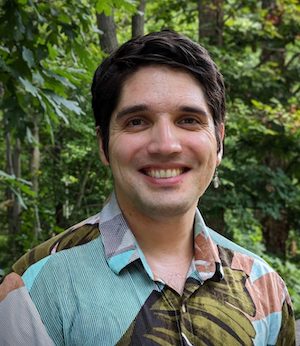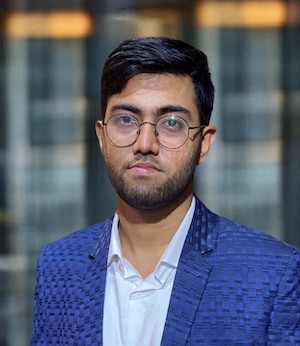The Institute of Digital Innovation (IDIA) at George Mason University has announced its second cohort of IDIA Predoctoral Fellows: Alonso Gabriel Ogueda-Oliva, Dibyendu Das, and Erika De Los Santos.
Applicants to the competitive fellowship program are encouraged to form an interdisciplinary team of faculty mentors across the Mason ecosystem and propose an ambitious, interdisciplinary research agenda that aligns with IDIA’s mission of catalyzing cutting-edge computing research that shapes digital society and promotes equality, well-being, security, and prosperity.

Ogueda-Oliva, a PhD student in mathematics, is working on “A New Data-Driven Machine Learning Framework to Predict Dynamics of Infectious Diseases Incorporating Human Behavior in Epidemiological Models.” His project will integrate social and behavioral sciences research and predictive analytics to improve mathematical modeling of infectious diseases to minimize unintended outcomes of public health interventions used in response to pandemics.
“If we are able to understand how human behavior impacts diseases spread, we may potentially save lives,” said Ogueda-Oliva, who holds a BS in mathematical civil engineering and an MS in mathematics from Universidad Tecnica Federico Santa Maria in his native Chile. “The project itself can help identify and address health disparities by studying the spread of infectious diseases and developing effective interventions that target marginalized populations.”
His faculty mentors are Padmanabhan Seshaiyer, a professor in the Mathematical Sciences Department; Taylor Anderson, an assistant professor in the Geography and Geoinformation Science Department, and Brian Levy, an assistant professor in the Sociology and Anthropology Department.
“I have worked in different projects throughout my career, mostly on education and tsunami evacuation modeling,” said Ogueda-Oliva. “Now, with the help of my advisors, I can bring all the skills I have learned during these years in order to make a contribution to society.”

Das, a computer science doctoral student, is working on “Motion Memory: Leveraging Past Experiences to Accelerate Future Motion Planning,” a project that aims to lower computational resources needed by robots, making them more cost-effective and efficient for a variety of industry needs.
Das said seeing how robotics continue to improve quality of life for humans inspired him. “The potential for robots to learn from experience, much like humans, and improve their performance over time promises not only to advance the field of robotics but also to create tangible benefits for society,” said Das, who has a BS in engineering and computer science from Bangladesh University of Engineering and Technology
His faculty mentor team includes Xuesu Xiao of the Department of Computer Science and Xuan Wang and Daigo Shishika in the Department of Electrical and Computer Engineering.
A notable achievement Das and his mentors have made in their work on this project is “developing a novel indexing system involving data hallucination that dramatically improved retrieval times, which could be considered a breakthrough in the field.”

De Los Santos, a psychology doctoral student, is working on the project “Human-AI Cooperative System to Detect Automated Deepfake Deception,” which focuses on designing ways for humans and artificial intelligence (AI) to collaborate and optimize deepfake detection. Deepfakes are computerized reconstructions of a person’s image or likeness.
“We want to understand human cognition and its limitations,” said De Los Santos. “We want to know about our biases and our vulnerabilities, especially with regards to implementing these AI and machine learning systems.”
After receiving a BA in psychology at Texas Tech University, De Los Santos came to Mason, earning a MA in psychology with a concentration in human factors and applied cognition in 2020. She works in the Arch and Hemodynamics, Automation, Resilience, and Trust (HeART) Labs in the Department of Psychology.
De Los Santos’ mentors include Daniel Barbará and Giuseppe Ateniese, professors in the Department of Computer Science, and Gerald Matthews and Tyler Shaw, professors in the Department of Psychology.
“We're hoping that this understanding can lead to practical guidelines for cybersecurity engineers as they begin to design these AI and machine learning systems,” she said. “We're also hoping to develop a training method for humans to optimize these utilization cues that the AI is providing to increase our personal safety and our well-being.”
